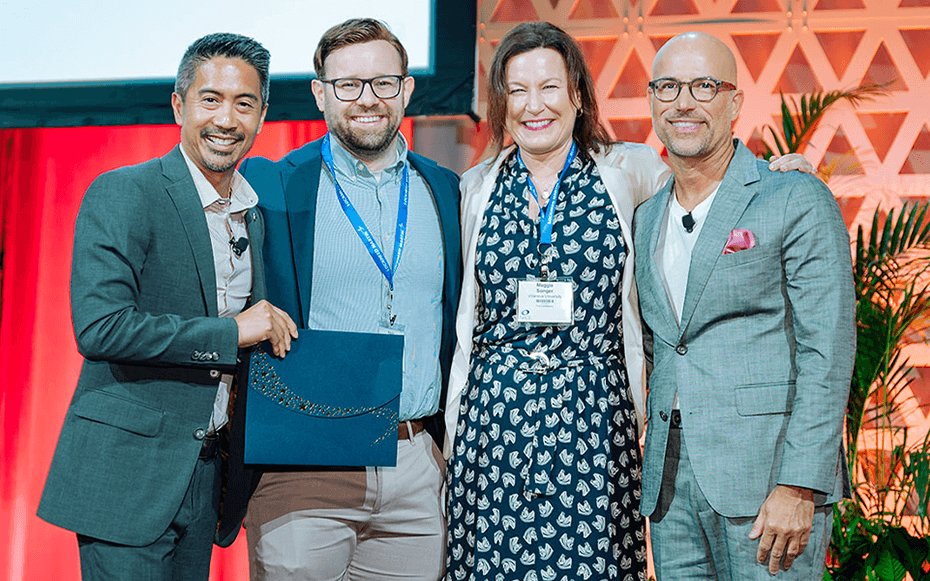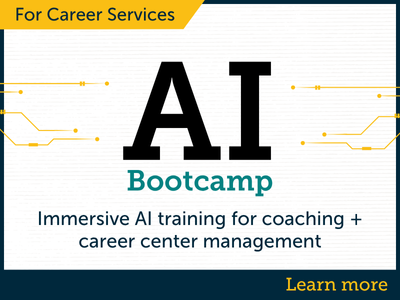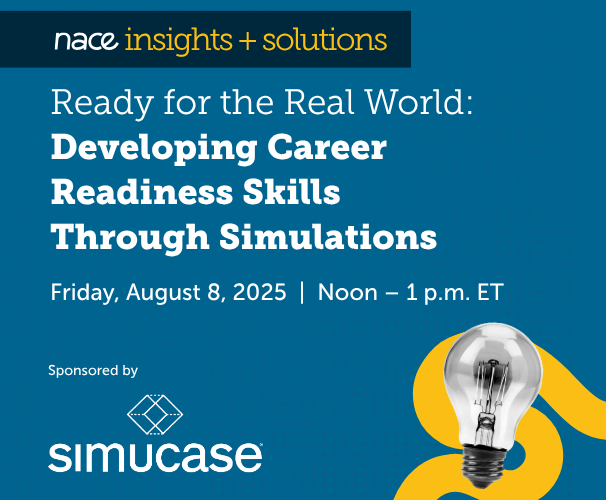Recognizing that the number of students with disabilities is consistently rising and the increased focus on disability inclusion by employers hiring college students, Villanova University developed its Disability Inclusion in the Workplace Conference to provide valuable information and insight and provide a forum for students to tell their experiences.
The Villanova University Disability Inclusion in the Workplace Conference is a half-day program designed primarily with hiring employers in mind to help them build disability inclusion into internship and entry-level hire experiences. The conference features students and alumni across the ability spectrum, employers with disability inclusion initiatives, and disability inclusion advocates.
“Sponsors enable the conference to be free of charge to all attendees, increasing accessibility to the event,” says Kevin Grubb, Villanova’s associate vice provost, career and professional development.
“Villanova University’s career center, learning support services, and office of disability services formed the partnership to deliver the conference on behalf of the university.”
NACE AWARD WINNER
Villanova University is the college winner of the 2023 NACE Award for Diversity, Equity and Inclusion Excellence for its “Disability Inclusion in the Workplace Conference.” For more information about the NACE Awards program and the full list of award winners/honorable mentions, see www.naceweb.org/about-us/nace-awards/.Responding to Trends
Grubb explains that long-standing data from the United States Bureau of Labor Statistics show people with disabilities are unemployed at twice the rate of people without disabilities.
“At Villanova, like most higher education institutions, the number of students with disabilities is consistently rising,” he says.
“Additionally, employers of all shapes and sizes are increasingly focusing on disability inclusion as a significant part of their talent recruitment and retention strategy. In order to support students, continue to be seen as a strategic partner to employers, and elevate our own practices, we developed this conference. It provides a unique opportunity for people and organizations to engage in dialogue with each other and learn about how to advance disability inclusion as they hire college students into internship and entry-level roles.”
Grubb explains that the Villanova University Disability Inclusion in the Workplace Conference has two primary purposes:
The partnership knows that students with disabilities face barriers to entering employment that those without disabilities do not. Recognizing the university’s position of power in connecting its students to opportunities, the partners want to do more than simply support students with disabilities as they navigate these barriers; they want to remove the barriers with them. The Villanova partnership designed the conference to do just that by educating employers on how to change recruiting and inclusion practices to ensure people with disabilities can fully participate in meaningful work.
The conference provides direct opportunities to connect Villanova students and alumni across the ability spectrum with hiring employers. The partnership understood that, if it was to bring many employers to campus, it wanted to maximize the opportunity for longer-term individual and institutional impact.
Conference Details
The Villanova University Disability Inclusion in the Workplace Conference was held on December 6, 2022, as part of the celebration of International Day of Persons with Disabilities. The conference welcomed more than 100 employers to Villanova’s campus; more than 100 additional individuals joined the livestream of the keynote address delivered by Caroline Casey, businesswoman and activist behind The Valuable 500, the world’s largest CEO collective and business move for disability inclusion.
Special invitations to the in-person conference were extended to 20 Villanova students heavily involved in disability inclusion work, including several enrolled in the university’s deaf and disability studies minor.
Conference attendees learned from Villanova students across the ability spectrum, university representatives, and industry leaders in disability inclusion. Topics of discussion throughout the day included:
- Organizational readiness for disability inclusion;
- Student experiences and expectations;
- Strategies to fully embrace the opportunity for disability inclusion in hybrid and remote work experiences; and
- Ways to design jobs and employment experiences for people with disabilities.
“This conference gave many of our students an opportunity to share their stories and talents in an environment where their lived experiences as individuals with disabilities were valued and appreciated,” says Nicole Subik, director of learning support service at Villanova.
To model inclusion, several sessions of the conference were live captioned and sensory and lactation rooms were set up for attendees.
“The Disability Inclusion in the Workplace Conference created an opportunity for employers, students, and members of the DEI community to gather and examine how truly dedicated the individual attending and the company they are connected to are to making a conscious effort to create more inclusion in the workplace…and I feel we created that opportunity,” says Greg Hannah, associate director of Villanova’s office of disability services.
“The students are the heartbeat of this university. When a student connects with the office of disability services and/or the learning support services office we want to not only support the day-to-day university journey, but also present opportunities for personal and professional growth. The ability to be present, engage, and experience this conference will hopefully be the catalyst to ignite change in this space.”
Conference Evaluations and Outcomes
Upon conclusion of the conference, Villanova sent out a survey to all attendees with questions designed to measure the conference’s impact as aligned to the organizers’ objectives. The results from that survey demonstrated that the partnership achieved its objectives:
- 98% of all attendees would recommend the Villanova University Disability Inclusion in the Workplace Conference to a friend or colleague;
- 96% of employer attendees intended to share information learned at the conference with people in their organizations;
- 80% of employer attendees intended to suggest their organization change or change parts of its hiring processes;
- 80% of employer attendees intended to suggest their organization change or change the way it creates inclusive environments; and
- 76% of employer attendees intended to explore options for hiring Villanova students and alumni.
Subik says that the Disability Inclusion in the Workplace Conference provided not only a chance for employers to learn and connect, but also a time for self-reflection about Villanova’s own policies.
“Carving out a space to learn and grow is so important, and I had many vulnerable conversations with attendees at the workplace conference,” she notes.
“When we think about inclusive practices, we all need to be open to saying, ‘I don’t know’ or ‘This is something we need to reexamine at our company.’ I believe we were successful in creating that honest space in the conference. I would be willing to bet that most of the attendees walked away with at least one to-do item that will make their workplace more inclusive. I know I did.”
Supporting Others
At the request of recruiting and inclusion leaders, Villanova is now working with several employers to develop new and deeper partnership opportunities and continuing conversations with leadership at several other organizations about how to scale this work.
“We have received so much positive feedback about this program and feel compelled to support others who want to do similar work,” Grubb says.
“We are exploring opportunities to consult with more higher education institutions and employers that may partner with us to examine and eliminate the barriers to employment that disabled people face.”
He explains that the most important element of the conference and everything that has come since is listening to the stakeholders.
“Every part of the process of planning and executing this event involved conversation, feedback, and a commitment to always keeping disabled perspectives at the center of the work,” Grubb stresses.
“Doing so informed all of our decision-making and, in turn, educated and inspired others to do the same, which was an explicitly intended outcome of the conference. There is tremendous energy and support for advancing disability inclusion in the workplace. As awareness of the disability experience has grown in our collective conscious, more people are realizing their lives are impacted by how we engage people across the ability spectrum. It is essential that we, as career services professionals, give space for these voices and experiences to be seen and heard.”







